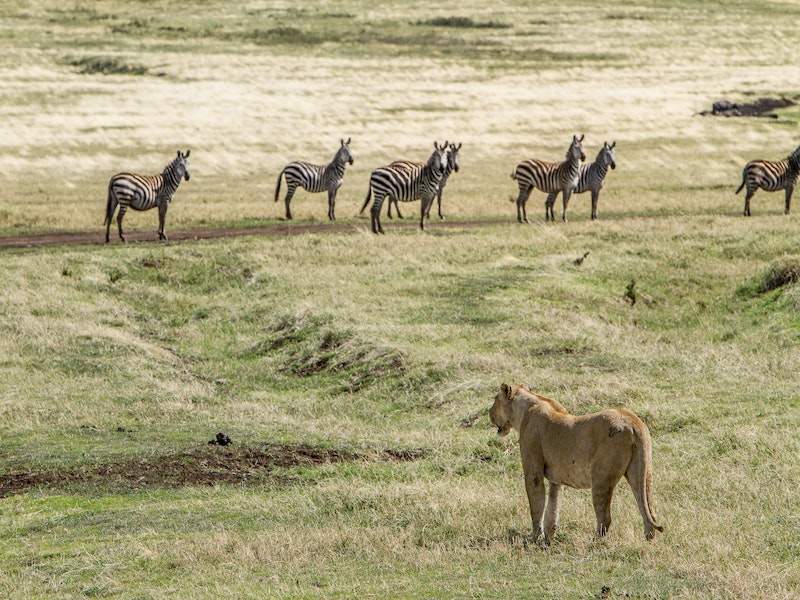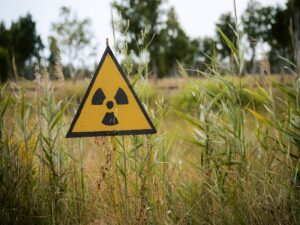Today, if you have enough money, you can buy pretty much anything you want and do anything you want. But our domination of the Earth, through the technology that has made us so powerful, has a dark side that could lead to our destruction.
The only thing controlling humans is ourselves, but we’re not doing a good job of it. So, why is it an issue?
The problem revolves around how we use the Earth’s energy. Because when you strip away any meaning we give to the natural world, it is, in its essence, a giant energy system. A hunt between a lion and a zebra helps explain the importance of an energy balance in maintaining healthy ecosystems.
A system in balance
Picture a herd of zebra grazing on grass. When the zebra eats the grass, the nutrients get converted into usable energy by the zebra’s body, allowing it to do everything a zebra does.
The grass also needs an energy input. The grass gets its energy from the sun and converts that energy through the process of photosynthesis.
The process of photosynthesis is the building block of all life on Earth. Without the ability of plants and trees to convert energy from the sun, there would be no life on Earth.
In turn, the lion also need inputs of energy to survive. Lions get their energy from the animals they prey on. And they chase and kill zebra (amongst others) to get it. Lions don’t do this for fun; they do it to survive.
You may view a lion eating the zebra as savage, but the predator plays a crucial function in the ecosystem.
Zebra paradise — a system out of balance
Why? Let’s imagine a scenario where the zebra had no predators. That would be great news for the zebra, who could saunter around the savannah without fear of being eaten alive.
With no natural predators, the number of zebra would increase. But more zebra would mean more demand placed on the grasslands.
The problem is that while the population of zebra would increase, the grass needed to sustain the zebra would not.
More zebra would place increasing pressure on a limited supply of food. Once the number of zebra becomes too large, the grasslands won’t be able to maintain the population.
This dynamic would result in zebra going hungry; inevitably, lots of the zebra will die as there is not enough grass to maintain an ever-growing population. What began as a zebra paradise would turn into zebra hell, with devastation afflicting the herd.
Once enough zebra died from starvation, the ecosystem would return to some form of balance. But inevitably, it would go out of balance again and again because there is no predator to control the number of zebra. And so, the ecosystem would be in a perpetual state of imbalance.
Tipping points
The problem with having no predator is balance. Predators play a crucial function in maintaining an energy balance within an ecosystem. The sun ‘feeding’ the grass, the grass, feeding the zebra, the zebra feeding the lion. Balance — or, to put it another way, a system in a steady state.
There is a balance between the number of zebra, the population of lions that prey on the zebra and the grasslands the zebra depend on for food.
Without the predator, it creates a positive feedback loop. The more and more pressure you place on a system (in our example, through the Zebra population increasing), the further away you take it from the balance that maintained the ecosystem.
The further away you take a system from the steady-state, the higher the chances are that a tipping point will be reached. In zebra paradise, the tipping point is where the population of zebra becomes too large for the grass to sustain them, leading to starvation.
Lions hunting and killing zebra may seem brutal, but it would be far more brutal and devastating to the herd if zebra were dying en masse through starvation.
The human anomaly
Humanity is uncannily like the zebra on the savannah with no predator, only on a planetary scale.
In the web of life, we are an anomaly. Through scientific discoveries, humans have been able to gain a deep understanding of the natural world. It’s the application of scientific understanding through technology that provides us with godlike powers. And that technology has transformed civilisation into the modern cosmopolitan societies we now live in.
An issue with this technology is that sustaining the civilisation it creates requires vast inputs of energy. The issue with that is that just like the zebra with no predator, our ability to shape the world to support our needs has created a vast energy imbalance.
That, in short, is what the climate crisis and the ecological crisis we are facing is all about. We are converting energy into products and services that are useful for society.
But every action has a reaction — and our behaviour is inducing catastrophic changes to the environment.
Overshoot day
Earth Overshoot Day is a symbol of the energy imbalance we have created. “Earth Overshoot Day marks the date when humanity’s demand for ecological resources and services in a given year exceeds what Earth can regenerate in that year.” In 2021, it fell on July 29 — hardly a day to celebrate.
And over the coming decades, the date will continue moving forward, increasing the energy imbalance—a reason why is that the global middle class is set to reach 5.3 billion people by 2030.
More people joining the global middle class is a good thing. It means more people are climbing out of poverty and have more disposable income. But the major issue is what people do with their disposable income.
In the consumer culture that dominates modern society, we’re taught success and happiness can be bought.
The poor aspire to lead a consumer-centric Western lifestyle because everyone believes this lifestyle is the pinnacle of success. The issue is that consumer culture is energy-intensive.
In the next 30 years, the Energy Information Administration (EIA) predicts global energy demands will increase by 50%. While the EIA predicts renewables will make up 28% of energy consumption (from 18% today), 68% will still come from fossil fuels.
The IPCC argues to limit the impacts of a changing climate; global warming can’t increase by over 1.5 °C above pre-industrial levels. To achieve that goal, carbon neutrality needs to be reached by 2050. Given the trajectory we’re on, that seems optimistic.
Rather than deep decarbonisation of the global energy system, emissions are set to increase exponentially over the next few decades, which could lead to runaway climate change.
Foresight
Most people still maintain an attitude that the energy imbalance we are creating won’t be that bad. Or if it is, they can rest easy that it won’t happen in their lifetimes, so they have nothing to worry about.
But like in zebra paradise, the more we continue to behave as we are, the greater the likelihood there is that we will push Earth’s critical life support systems beyond a tipping point.
We are now locked into a way of doing things. The idea of not living in this civilisation is unimaginable. The issue is that we are in an energy trap.
The more we continue to behave as we are, the more reliant we become on energy inputs. The more energy we need to sustain civilisation, the greater the energy imbalance we create. The greater the energy imbalance, the greater the chance of tipping the Earth into a new state, one that will not be hospitable to life as we know it.
It feels all doom and gloom, but the difference between humans and the zebra with no predator is that we have foresight. We know that our behaviour is leading to a terrible future. And so, we have the power to reshape civilisation so that it works in harmony with nature by creating a civilisation that works in balance within it.
While we have the technological ability, we lack the will to make the necessary changes.
And so, just like the zebra enjoying itself on the savannah, the longer we continue behaving as we do, the more aggressive the changes that behaviour will trigger. The fear is that if the Earth corrects itself and lurches into a new state, the change will cause unimaginable pain and suffering. That’s not a future anyone wants, but it is a future we are hurtling towards.



